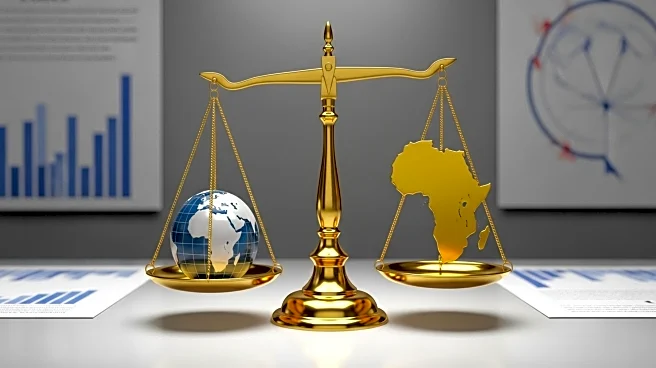What's Happening?
The African Growth and Opportunity Act (AGOA), a trade program that has provided duty-free access to the U.S. market for sub-Saharan African countries, expired despite President Trump's support for its extension. The program, which has been credited with creating jobs and boosting economic growth in Africa, was last extended in 2015. African leaders and trade representatives had engaged with U.S. lawmakers and the Trump administration to advocate for its renewal. However, legislative priorities, including reciprocal tariffs and a government shutdown, led to AGOA's lapse. As a result, tariffs on apparel from countries like Lesotho, Kenya, and Madagascar have increased significantly, impacting employment and economic stability in these regions.
Why It's Important?
The expiration of AGOA raises concerns about the U.S.'s commitment to Africa and its trade relations. The lapse could diminish U.S. influence in Africa, potentially allowing rival powers like China and Russia to expand their presence. AGOA has been a key component of U.S.-Africa trade relations, symbolizing engagement and partnership. Its expiration could lead to economic challenges for African countries reliant on AGOA, affecting industries such as textiles and apparel. The increased tariffs may result in job losses and economic instability, particularly in countries where a significant portion of employment is tied to AGOA-related industries.
What's Next?
There is potential for AGOA's renewal through legislative action, such as a short-term funding extension. Lawmakers could work on a vehicle for AGOA's renewal, possibly as soon as November. The lapse has prompted discussions on the future of U.S.-Africa trade relations and the need for a more comprehensive approach to support economic diversification and competitiveness in African markets. Stakeholders, including U.S.-based companies, may face decisions on whether to continue partnerships with African factories or adjust to the new tariff landscape.
Beyond the Headlines
The expiration of AGOA highlights broader issues in U.S.-Africa trade relations, including the need for diversification and increased competitiveness in global markets. Critics argue that AGOA has not fully achieved its goals, with a significant portion of U.S. imports from Africa concentrated in a few countries and dominated by oil and gas exports. The situation underscores the importance of developing more robust trade policies that address these challenges and foster sustainable economic growth in Africa.









